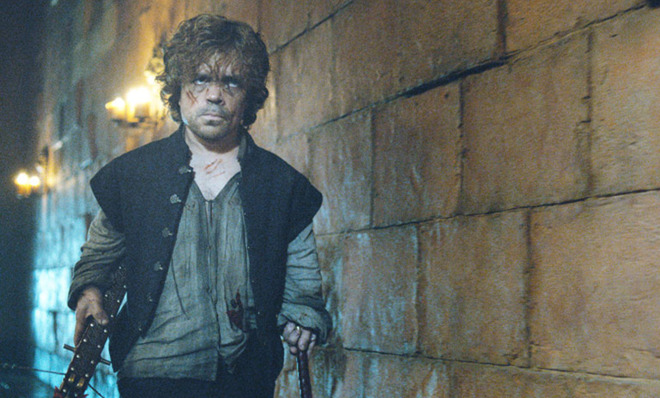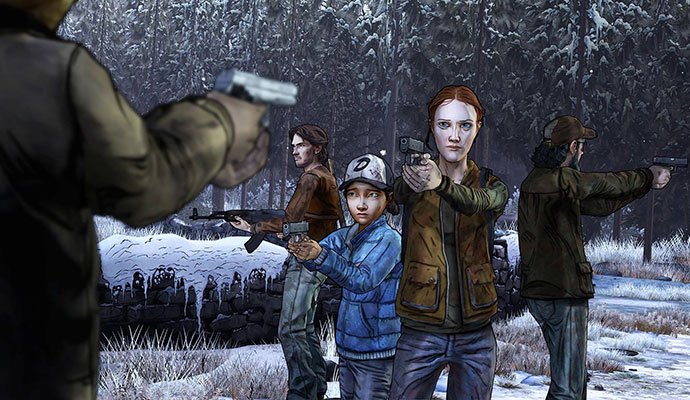Why Telltale's Game of Thrones might finally bridge the gap between TV shows and video games
Popular television shows have largely failed to make the jump to video games. The upcoming adaptation of the HBO fantasy drama could buck the trend.


A free daily email with the biggest news stories of the day – and the best features from TheWeek.com
You are now subscribed
Your newsletter sign-up was successful
Video games and television have never had a particularly fruitful relationship. The small screen has butchered video games with misbegotten junk like The Super Mario Brothers Super Show and hilariously stereotypical garbage like this scene from NBC's Life.
Video games haven't treated TV all that much better. For decades, developers have been churning out mediocre-to-awful titles based on popular TV shows. But despite an abundance of source material, there has never been a truly great video game adapted from a TV show.
I should know. I have a long, embarrassing history of slogging through video games that promise to expand upon the stories of my favorite TV shows — no matter how terrible they end up being. I've punched my way through The Sopranos: Road to Respect, defused bombs in 24: The Game, and scoured for clues in Lost: Via Domus. I have every reason to be skeptical of any new entries in the genre.
The Week
Escape your echo chamber. Get the facts behind the news, plus analysis from multiple perspectives.

Sign up for The Week's Free Newsletters
From our morning news briefing to a weekly Good News Newsletter, get the best of The Week delivered directly to your inbox.
From our morning news briefing to a weekly Good News Newsletter, get the best of The Week delivered directly to your inbox.
But after years of failures, I'm cautiously optimistic about Telltale Games' upcoming adaptation of HBO's Game of Thrones. What's different this time?
The technology is finally ready
Though the aesthetics of animated TV shows like Ducktales and Batman: The Animated Series were easier to translate for home consoles, live-action TV shows proved much harder to capture. The X-Files Game (1998) used full-motion video to re-create the feel of the show. But the relatively accurate visuals came at a price: the "game" itself was barely interactive, and the space taken up by all those videos required the developers to spread the game over four PlayStation discs or seven CD-ROMs.
But the technology has improved. Video games have been particularly successful at translating animation. Platinum Games' The Legend of Korra convincingly reshapes the 2-D animation of the Nickelodeon series into a 3-D brawler. The latest South Park video game, The Stick of Truth, is essentially indistinguishable from the TV show, from its voice-acting to its visual design.
A free daily email with the biggest news stories of the day – and the best features from TheWeek.com
The next step is approximating the look of a live-action series. For all its flaws, the previous crack at a Game of Thrones video game (by developer Cyanide) managed to capture the look and feel of the HBO drama, and there's no reason the new one can't do the same.
Game creators are finally embracing what makes TV shows great
There's another reason most of the better, earlier TV-to-video game adaptations were based on animated shows: it's a lot easier to make a video game out of a show like Batman, Teenage Mutant Ninja Turtles, or Darkwing Duck, which involved no great shortage of punching and kicking. (It's also why something like The Simpsons Arcade Game can be great while having almost nothing in common with the TV show that spawned it.)
But game developers have routinely struggled when adapting a show with more depth. Take The Sopranos — a complex, sprawling drama in which the threat of violence is omnipresent, but actual violence is both ugly and rare. Like The Godfather, which was similarly adapted into an ill-conceived, violence-heavy game, it's absolutely terrible fodder for a video game. The Sopranos: Road to Respect casts the player as Big Pussy's illegitimate son, running through a long string of cookie-cutter rooms and punching out anyone who gets in the way.
It's a disservice to The Sopranos (and to its many talented actors, who actually showed up to voice their digital counterparts). It's the same thing that dragged down Cyanide's poorly received crack at Game of Thrones in 2012, which padded out a passable narrative with terrible third-person sword combat.

Unfortunately, the "take a popular TV show and toss in a bunch of senseless violence" model of development still hasn't totally been retired. Last year also saw the release of a Walking Dead video game with close ties to the TV show. Called Survival Instinct, it allows players to step into the role of fan-favorite character Daryl Dixon. But Survival Instinct fundamentally miscalculates the appeal of The Walking Dead by turning the story of Daryl and his brother Merle into an absurdly generic first-person shooter, with a seemingly endless string of zombies to dispatch.
Fortunately, those looking to tackle the zombie drama in video-game form had an alternative: Telltale Games' original take on The Walking Dead, which draws much of its inspiration from the original comics. Telltale's Walking Dead understands that shooting zombies isn't the most interesting thing about The Walking Dead's story. Instead, it tasks the player with difficult moral choices: who to trust, what to lie about, and when it's worth turning on your fellow survivors for a better chance at survival.
Telltale's approach to the zombie franchise is equally suited to the moral and political complexities of Game of Thrones. Like The Walking Dead, Game of Thrones has plenty of violence — but like The Walking Dead, it's the motivation behind the violence that carries real weight. The Red Wedding wouldn't be an interesting action sequence; it's just a bunch of guys shooting arrows at their defenseless guests. But as a moral sequence, it holds immense promise. Imagine controlling Walder Frey as he makes a deal to sell out the Starks, or Catelyn Stark as she desperately puts a knife to the throat of Walder Frey's wife, or Roose Bolton as he decides to gut Robb Stark once and for all. That's the core of what makes Game of Thrones interesting, and Telltale is uniquely positioned to replicate it.
TV shows are finally willing to bring video games into the narrative
The only thing that keeps Telltale's The Walking Dead from being the best-ever video game based on a TV show is that it's not directly based on the show itself. Characters like Glenn and Hershel shows up for small cameos, but despite some vague teases from Walking Dead creator Robert Kirkman, it seems unlikely that the stories of the TV series and the video game will cross over in any meaningful way.
This is the other major problem for TV shows based on video games. Players want something that will meaningfully affect their understanding of a TV show's narrative, but writers — knowing that a small minority of people will actually play the games — are reluctant to include anything that has a significant impact on a TV show's narrative. This is why video games based on The Sopranos and Lost force the player to control bland, video game-only supporting characters, limiting the TV characters you actually like to a few scattered cameos. (Defiance, Syfy's ambitious but disappointing attempt to launch an interdependent TV show and video game, attempted to buck this trend. Unfortunately, neither the TV show nor the game is interesting enough to merit any serious consideration.)
The best approach to this problem is a kind of middle ground: using a video game to offer new perspectives or context for fans who can't get enough of a TV show's story. 24: The Game — which, in truth, isn't all that bad — fills in a major story gap from the TV show that would otherwise go unexplained: the immediate aftermath of the assassination attempt on President David Palmer at the end of 24's second season, which was abandoned by the TV show's writers by the time the third season came around. You'll never need any of the information revealed in the video game to understand 24's larger story, but diehard fans will be interested just the same.
Telltale's Game of Thrones promises something similar: a narrative that will actually deepen the player's understanding of the TV show without tying the hands of the show's creative team. A recent press release revealed that the new Game of Thrones game will put the players in control of House Forrester, a noble family from the North that plays a small role in George R.R. Martin's narrative. The video game will begin near the end of the HBO drama's third season, and end at the beginning of Season 5.
Game of Thrones is uniquely well-suited to this sprawling approach, which will take players everywhere from Essos to King's Landing to The Wall — and its story will exist within the TV show's canon, offering new perspective on the War of the Five Kings from characters whose perspectives would otherwise go untold.
It remains to be seen whether Telltale's Game of Thrones can live up to all these lofty ambitions. But for the first time, a company trying to bridge the gap between TV and video games seems to understand the strengths of both mediums — and how best to combine them.
Scott Meslow is the entertainment editor for TheWeek.com. He has written about film and television at publications including The Atlantic, POLITICO Magazine, and Vulture.
-
 The ‘ravenous’ demand for Cornish minerals
The ‘ravenous’ demand for Cornish mineralsUnder the Radar Growing need for critical minerals to power tech has intensified ‘appetite’ for lithium, which could be a ‘huge boon’ for local economy
-
 Why are election experts taking Trump’s midterm threats seriously?
Why are election experts taking Trump’s midterm threats seriously?IN THE SPOTLIGHT As the president muses about polling place deployments and a centralized electoral system aimed at one-party control, lawmakers are taking this administration at its word
-
 ‘Restaurateurs have become millionaires’
‘Restaurateurs have become millionaires’Instant Opinion Opinion, comment and editorials of the day
